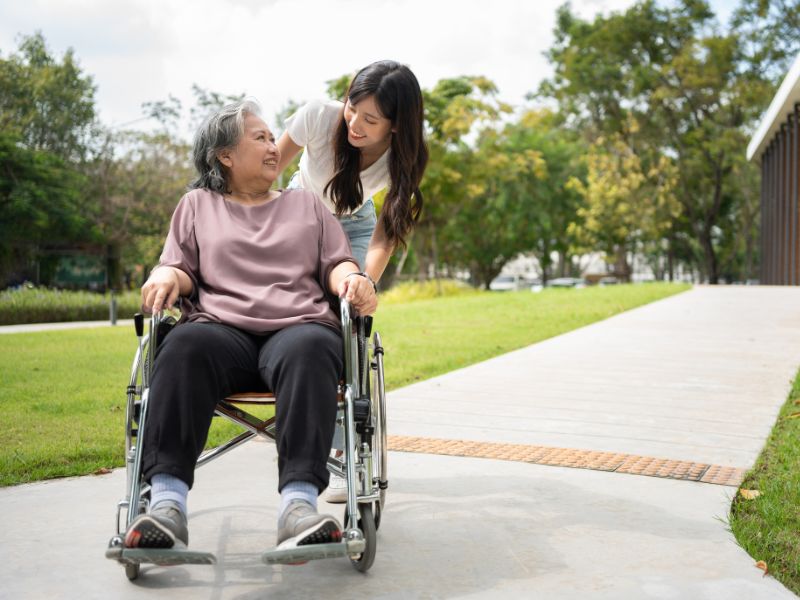Mom, daughter, writer, and friend. These are all words that describe me. But as of late, I have added one more title – caregiver.
I often read about the travails of caregivers from afar until I found myself with no choice but to step into this role. I am sandwiched between an 11-year-old and an 84-year-old. This sandwich is chock full of ingredients, packed very high and continues to get bigger by the day. No matter how insurmountable things look some days, I am the glue that keeps this sandwich from falling apart.
Family caregivers are often the unsung heroes of our healthcare system.
Caregivers are people of all ages and backgrounds and help people with serious and/or progressive illnesses meet a variety of needs, including assistance with daily tasks that can be challenging for older people and people with disabilities. These tasks can include assisting those needing care in navigating the healthcare system, managing medication, attending doctor’s appointments, helping with household chores, providing transportation and preparing meals. Whatever needs to be done – caregivers get it done.
I am a long-distance caregiver for my mother, which presents its own unique set of challenges. Caring from afar requires additional coordination and planning, and often, a lot of worry because you aren’t with the person you are caring for daily.
As things have evolved, it became time for me to discuss with my daughter about my caregiving role. When asked how to approach caregiving discussions with young people, Jason Resendez, president & CEO of the National Alliance for Caregiving, said, “Caregiving is a common thread that weaves through millions of families. With over 5.4 million incredible young people already engaged in care, it’s vital we educate all children about caregiving – its joys, its hardships and its profound importance. Including children and young people in these conversations is the only way we can truly create a culture of care.”
My discussions with my daughter have been organic and have evolved as she has gotten older and as questions arise. First and foremost, caregiving conversations with children should begin with honesty. Kids and young adults can tell if you aren’t being truthful. Parents must also provide age-appropriate information to their children. You can always build upon these conversations as they age.
Keep these topics in mind during these discussions:
-
Defining the Caregiver Role:
We often don’t want to use the term “caregiver” because it can sound formal or it’s something that we think that we are supposed to do due to cultural norms. Maybe tell your child that you are “helping” a family member or friend. The important point to convey is your role in providing care and how this role could impact your time, finances and mental and physical health.
-
Why Caregiving is Needed:
If your child is asking why someone needs care, this may be because the person has a chronic illness. These discussions can be scary for kids but when the time comes, it’s OK to provide bite-sized nuggets of information. Maybe try saying “Grandma isn’t feeling well and I will be helping her for a while.” Kids may ask if the person will die, and you may need to be prepared to answer these types of questions to the best of your ability and comfort level and according to your child’s readiness and tolerance for this type of information.
-
How Caregiving Affects You, Your Family and Your Child:
Let your kids know if your tank is running low. Caregiving is stressful and mentally exhausting at times. Caregiving may change your family dynamic but try to be open if you don’t know when things will return to “normal.” Reassure your child that you are still there for them, and that they can always come to you with their questions and concerns.
-
Your Feelings About Providing Care:
Caregiving can open old wounds with the person that you are providing care for. Caregiving is not always pretty. It’s OK to tell your child if you are angry or upset. Naming your emotions serves your child better than having them see or feel your anger, hurt or other emotions that you are experiencing without understanding what is going on.
If you aren’t a caregiver now, you will most likely be one in the future or you will need the assistance of a caregiver. Care is the glue that binds all of us – old and young.
Kristi Guillory Reid is an attorney, author and consultant. Her first book, Harper Counts Her Blessings, teaches children about the value of thankfulness and gratitude.
Books You Can Use to Talk to Kids About Caregiving
- A Kids Book About Long-Term Care by Jenny Abeling
- Family Caregiver Alliance list, “Books to Help Children”
by Jessica Meadows, Leonardo Stone


